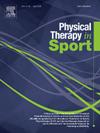Progressive resistance training improves single-leg vertical jump after anterior cruciate ligament reconstruction: Non-randomized controlled trial study
IF 2.2
3区 医学
Q1 REHABILITATION
引用次数: 0
Abstract
Objectives
The study was investigating the effect of a progressive resistance training program on the recovery of patients with anterior cruciate ligament reconstruction in terms of kinematics, kinetics and muscle strength.
Design
Longitudinal cohort study.
Setting
Hospital laboratory.
Participants
Of the 42 patients were finally included: 22 patients in the progressive resistance training group and 20 in the control group.
Main outcome measures
Questionnaire, single-leg vertical jump, and muscle strength were collected preoperatively and at 16, 28 weeks, and 1 year postoperatively.
Results
At 28 weeks, the height of the single-leg vertical jump for the injured knee was 203 and 157 mm (p = 0.045) and the peak knee flexion angle after landing for the injured knee was 31°and 23° (p = 0.027) in the progressive resistance training and control groups, respectively. The progressive resistance training group showed a significant increase in the knee extensor symmetry index after the 24-week exercise training compared from 58% preoperatively to 79% (p = 0.001) after training completion, which lasted up to 1 year postoperatively.
Conclusion
Progressive resistance training significantly improved knee extensor symmetry, single-leg vertical jump height, and peak knee flexion angle after landing, outperforming the control group across all measures.
渐进阻力训练可改善前十字韧带重建后的单腿垂直跳跃:非随机对照试验研究
目的 本研究从运动学、动力学和肌肉力量方面探讨渐进式阻力训练计划对前交叉韧带重建患者恢复的影响:结果28周时,在渐进阻力训练组和对照组中,受伤膝关节的单腿垂直跳跃高度分别为203毫米和157毫米(P = 0.045),受伤膝关节着地后的膝关节屈曲角度峰值分别为31°和23°(P = 0.027)。结论 渐进式阻力训练可显著改善膝关节伸肌对称性、单腿垂直跳跃高度和着地后膝关节屈曲角度峰值,在所有指标上均优于对照组。
本文章由计算机程序翻译,如有差异,请以英文原文为准。
求助全文
约1分钟内获得全文
求助全文
来源期刊

Physical Therapy in Sport
医学-康复医学
CiteScore
4.50
自引率
8.30%
发文量
125
审稿时长
39 days
期刊介绍:
Physical Therapy in Sport is an international peer-reviewed journal that provides a forum for the publication of research and clinical practice material relevant to the healthcare professions involved in sports and exercise medicine, and rehabilitation. The journal publishes material that is indispensable for day-to-day practice and continuing professional development. Physical Therapy in Sport covers topics dealing with the diagnosis, treatment, and prevention of injuries, as well as more general areas of sports and exercise medicine and related sports science.
The journal publishes original research, case studies, reviews, masterclasses, papers on clinical approaches, and book reviews, as well as occasional reports from conferences. Papers are double-blind peer-reviewed by our international advisory board and other international experts, and submissions from a broad range of disciplines are actively encouraged.
 求助内容:
求助内容: 应助结果提醒方式:
应助结果提醒方式:


